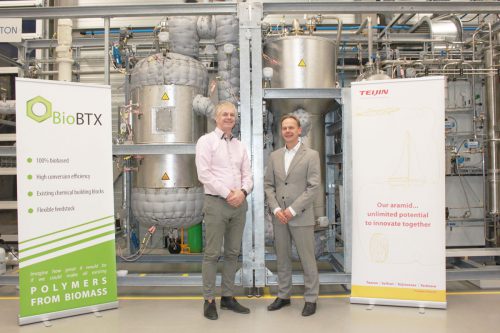Carduso Capital participation ‘BioBTX’ and Teijin Aramid are looking at sustainable feedstock for super fiber.
Groningen, Nederland, 30 Oktober 2018
The Japanese company, Teijin Aramid, and the Dutch BioBTX are working on a synthetic fiber made entirely of sustainable materials. The initiative that is about to start is financially supported by the provinces of Drenthe and Groningen and by Chemport Europe. Teijin Aramid has production facilities in Emmen and Delfzijl. The initiative contributes to making the industry greener. It also strengthens the position of the Northern Netherlands chemical cluster, also known as Chemport Europe.
Teijin Aramid produces super strong fibers in the Netherlands under the brand name Twaron®. In the Netherlands, the company has facilities in, among others, Delfzijl and Emmen. Their fibers are used worldwide in products that need to be made stronger, lighter and more durable. For example, in car tires, light freight containers, and protective clothing. To produce Twaron® fossil resources are used for which there are currently no sustainable alternatives.
Site Manager, Edward Groen, from Teijin Aramid in Delfzijl explains that his company wants to examine the possibility of producing a so-called bio-based version of their Twaron® fiber. “Sustainability is an important subject for us. We are focused on both sustainability improvement by the application of our products in the chain with a lighter weight and longer lifespan, and reducing our CO2 footprint during production. In production the focus is on reducing energy flows and making them more sustainable. We’re also exploring possibilities for greener raw materials. It’s fantastic to do this scouting with a partner in Groningen.”
BioBTX
To develop a green feedstock Teijin Aramid works together with the company BioBTX in Groningen. This company developed a sustainable technology that can transform renewable resources, such as biomass and residual products, into chemical resources, mainly benzene, toluene, and xylene (BTX). With the BioBTX technology, it is possible to produce these so-called aromatics in a sustainable manner and, thus, largely reduce CO2 emissions. BioBTX recently opened a pilot plant to produce aromatics on the Zernike Campus in Groningen. Based on these aromatics the chemical company Syncom will produce specific building blocks. The polymer and fibers will be made in the Research Center at Teijin Aramid in Arnhem, based on the processes in Delfzijl and Emmen.
Pieter Imhof, CEO at BioBTX, responds enthusiastically. “We have already demonstrated that it is technically feasible to make bio-based BTX and polyester. Via this path and with the renowned Teijin Aramid, we want to demonstrate that it can also be used as a raw material for high-quality applications that have very strict quality requirements!”

 Request financing
Request financing